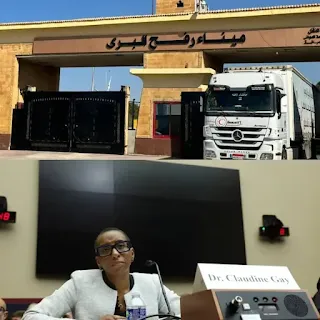More than ten ambassadors from different countries visited the Rafah border crossing with Gaza, to learn about the suffering to which the Palestinians are exposed, while Philippe Lazzarini, Director of UNRWA, briefed the diplomatic delegates on the horrific humanitarian situation in the Strip.
Delegates of a number of member states of the UN Security Council arrived on Monday in the Egyptian city of Al-Arish, and are scheduled to head to the Egyptian side of the Rafah border crossing, days after the United States dropped a draft resolution in the Council calling for a ceasefire in Gaza.
The one-day unofficial visit, organized by the UAE and Egypt, comes amid a worsening humanitarian crisis in the besieged Gaza Strip, which UN Secretary-General António Guterres has described as a “cemetery for children.”
More than ten ambassadors of countries, including Russia and the United Kingdom, which abstained from voting on the draft resolution calling for a ceasefire in Gaza, are participating in the visit. The representative of the United States, which used its veto power last week against a draft resolution proposed by the UAE, was absent, as was the representative of France.
An Egyptian Foreign Ministry official told the envoys during a press briefing following their arrival: “There is no justification for turning a blind eye to the pain and suffering to which the Palestinian people in Gaza are exposed.”
The Emirati delegate to the United Nations, Lana Nusseibeh, said that some countries are participating in the visit “in a national and personal capacity,” explaining that it aims to help them “not only understand the suffering and devastation experienced by the people of Gaza, but also their hope and strength.”
Philippe Lazzarini, Director of the United Nations Palestinian Refugee Agency (UNRWA), briefed delegates on the horrific humanitarian situation in Gaza before heading to the besieged Strip on his third visit since the war began last October.
“There is a deep feeling of frustration and disappointment, and also some anger because, we could not even reach a consensus on a ceasefire,” Lazzarini said after the meeting.
He added: "There is no truly safe place in the Gaza Strip. Even the United Nations headquarters, which currently host more than a million people, were bombed."
"Hunger is overwhelming"
Lazzarini said that the Palestinians feel a state of despair and "hunger is overwhelming in Gaza. Increasing numbers of people have not eaten for a day, two, or three days, People do not have anything at all."
The diplomats are scheduled to go to the Egyptian side of the Rafah crossing, and visit a hospital treating Palestinian patients in the Egyptian city of Al-Arish, close to the border with the Gaza Strip.
According to the United Nations, 1.9 million people, or about 85% of the population, were displaced from their homes in Gaza due to the war, which destroyed or damaged more than half of the homes.
After being forced to resign over Gaza, 500 academics support the president of Harvard University
More than 500 Harvard faculty members have signed a paper of support for the university's president, who was forced to resign by the US Congress after she defended pro-Gaza demonstrations on campus.
More than 500 faculty members at Harvard University signed a paper supporting the university's president, Claudine Gay, who announced her resignation on Sunday, forced to defend the demonstrations on campus in support of Gaza, stressing that this was "freedom of expression."
According to the New York Times, the university president was summoned a few days ago to the Education and Workforce Committee of the US Congress.
During the interrogation session in Congress, a number of committee members likened the calls of some student demonstrators for a new intifada to the Palestinian uprising against Israel in 1987, as if they were inciting “to commit genocide against the Jewish people in Israel and the world.”
When asked if this type of sloganeering contravenes Harvard's code of conduct, Gay responded: “We support freedom of expression, even if it concerns objectionable, offensive, and hateful opinions. When speech turns into conduct, it violates our policies, including those related to harassment.” Or bullying, we take measures."
But Gay's comment was not convincing to the committee, which demanded her resignation.
Subsequently, more than 500 Harvard faculty members gathered in support of Gay, signing a paper calling for “the strongest possible resistance to political pressures that interfere with academic freedom at Harvard.”
It is expected that the university’s Board of Directors, which consists of the president and members of Harvard University, will meet today to ultimately decide the future of the university president’s career.
On December 5, the committee summoned the President of the University of Pennsylvania, Elizabeth Magill, the President of Harvard University, Claudine Gay, and the President of the Massachusetts Institute of Technology (MIT), Sally Kornbluth, to the session “Holding University Presidents Accountable and Combating Anti-Semitism.”
The purpose of the session was to address incidents of anti-Semitism on campus, and they were invited to answer questions about their statements during the session.
The university presidents spent three hours answering questions about disciplinary actions against students on issues related to anti-Semitism, how universities represent different viewpoints, and security on campus.





